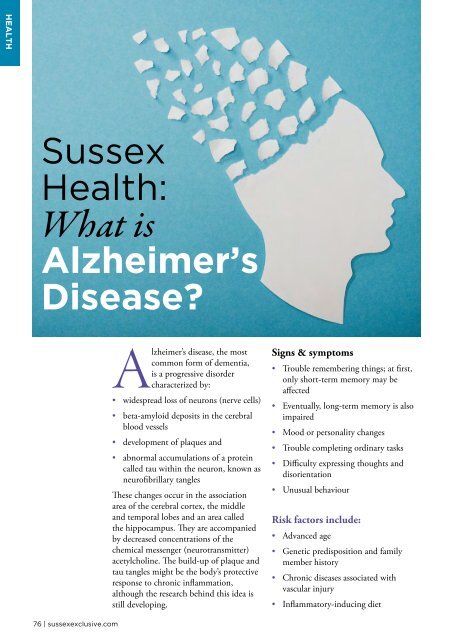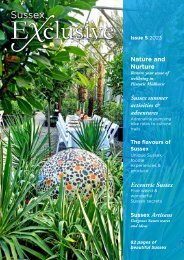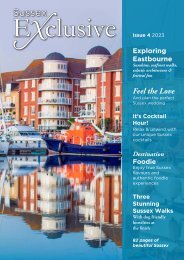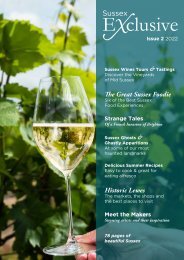Sussex Exclusive Magazine Issue 6 2023
In this edition, we are celebrating all things Christmas and New Year, Sussex wine and gin, and lots more. We have some great Sussex Christmas traditions (old and new) for you, a Brighton Christmas getaway, lots of Christmas gift ideas, and even more Christmas recipes, bakes, and treats. Of course, it's not all about Christmas and we also have the perfect (8) antidotes to help beat the January blues. And not a diet in sight! For the travellers and wanderlusters amongst you, we have a fabulous three-day road trip that follows in the footsteps of the Medieval pilgrims, has amazing views, and takes in castles, vineyards, and historic towns. Alternatively, you might want to hop across the channel and discover the Pays de Calais or throw caution to the wind with a luxury cruise around Iceland! Sussex is a great foodie destination with some amazing Sussex producers and foodie experiences. So grab a fork and tuck into mouthwatering recipes and some great foodie experiences. And discover more of our Sussex vineyards and spirit producers as we explore the history of the Sussex drink industry and taste a few favourites. You can always burn off any excesses with one of our warming winter walks. If that’s not enough, take our Sussex quiz, read our health advice and gardening tips, and check out our selection of things to do! And the really good news is that it's all completely free!
In this edition, we are celebrating all things Christmas and New Year, Sussex wine and gin, and lots more. We have some great Sussex Christmas traditions (old and new) for you, a Brighton Christmas getaway, lots of Christmas gift ideas, and even more Christmas recipes, bakes, and treats. Of course, it's not all about Christmas and we also have the perfect (8) antidotes to help beat the January blues. And not a diet in sight!
For the travellers and wanderlusters amongst you, we have a fabulous three-day road trip that follows in the footsteps of the Medieval pilgrims, has amazing views, and takes in castles, vineyards, and historic towns. Alternatively, you might want to hop across the channel and discover the Pays de Calais or throw caution to the wind with a luxury cruise around Iceland!
Sussex is a great foodie destination with some amazing Sussex producers and foodie experiences. So grab a fork and tuck into mouthwatering recipes and some great foodie experiences. And discover more of our Sussex vineyards and spirit producers as we explore the history of the Sussex drink industry and taste a few favourites. You can always burn off any excesses with one of our warming winter walks.
If that’s not enough, take our Sussex quiz, read our health advice and gardening tips, and check out our selection of things to do!
And the really good news is that it's all completely free!
You also want an ePaper? Increase the reach of your titles
YUMPU automatically turns print PDFs into web optimized ePapers that Google loves.
HEALTH<br />
HEALTH<br />
• Heavy metal toxicity and other<br />
environmental toxins<br />
• Chronic stress<br />
• Sleep issues<br />
• Sedentary lifestyle<br />
<strong>Sussex</strong><br />
Health:<br />
What is<br />
Alzheimer’s<br />
Disease?<br />
Alzheimer’s disease, the most<br />
common form of dementia,<br />
is a progressive disorder<br />
characterized by:<br />
• widespread loss of neurons (nerve cells)<br />
• beta-amyloid deposits in the cerebral<br />
blood vessels<br />
• development of plaques and<br />
• abnormal accumulations of a protein<br />
called tau within the neuron, known as<br />
neurofibrillary tangles<br />
These changes occur in the association<br />
area of the cerebral cortex, the middle<br />
and temporal lobes and an area called<br />
the hippocampus. They are accompanied<br />
by decreased concentrations of the<br />
chemical messenger (neurotransmitter)<br />
acetylcholine. The build-up of plaque and<br />
tau tangles might be the body’s protective<br />
response to chronic inflammation,<br />
although the research behind this idea is<br />
still developing.<br />
Signs & symptoms<br />
• Trouble remembering things; at first,<br />
only short-term memory may be<br />
affected<br />
• Eventually, long-term memory is also<br />
impaired<br />
• Mood or personality changes<br />
• Trouble completing ordinary tasks<br />
• Difficulty expressing thoughts and<br />
disorientation<br />
• Unusual behaviour<br />
Risk factors include:<br />
• Advanced age<br />
• Genetic predisposition and family<br />
member history<br />
• Chronic diseases associated with<br />
vascular injury<br />
• Inflammatory-inducing diet<br />
• Hormone imbalances<br />
• Head injury<br />
• Dysbiotic gut microbiome<br />
• Gum disease<br />
Dietary modification<br />
It remains controversial as to whether<br />
aluminium deposits in the brain can<br />
cause Alzheimer’s disease. Aluminium has<br />
been seen in amyloid plaques but there<br />
remains no solid evidence of a causal link.<br />
Nonetheless, it seems prudent for healthy<br />
people to take steps to minimize exposure to<br />
this unnecessary and potentially toxic metal.<br />
It is unlikely, however, that avoidance of<br />
aluminium exposure after the diagnosis of<br />
Alzheimer’s disease could significantly affect<br />
the course of the disease.<br />
One of the greatest risk factors for<br />
Alzheimer’s disease is obesity. People with<br />
a high BMI and the tendency to store fat<br />
around their waistline are 3.5 times more<br />
likely to be diagnosed with Alzheimer’s<br />
disease. One of the biggest culprits for<br />
this link may be the consumption of sugar<br />
which ultimately predisposes the body to<br />
a state of chronic inflammation.<br />
A diet high in healthy fats, whole grains,<br />
fish, lean proteins, nuts, fruits and<br />
vegetables has been shown to combat<br />
obesity, diabetes, and improve cognitive<br />
function. Berries, leafy greens like spinach<br />
and kale, as well as cruciferous vegetables<br />
like broccoli and brussels sprouts are an<br />
excellent source of antioxidants.<br />
Lifestyle modification<br />
Keeping active outside of one’s work,<br />
both physically and mentally, during<br />
midlife may help prevent Alzheimer’s<br />
disease. People with higher levels of nonoccupational<br />
activities, such as playing a<br />
musical instrument, gardening, physical<br />
exercise, or even playing board games, are<br />
less likely to develop Alzheimer’s later in<br />
life, according to repeated studies.<br />
Exposure to sunlight in the morning<br />
and a healthy, regular sleep pattern<br />
may protect against the development of<br />
Alzheimer’s, and slow its progress once<br />
established.<br />
Nutritional supplement treatment<br />
options<br />
Acetyl-L-carnitine – clinical trials have<br />
found that supplementing with acetyl-<br />
L-carnitine delays the progression of<br />
Alzheimer’s disease, improves memory,<br />
and enhances overall performance in<br />
some people with Alzheimer’s disease.<br />
Antioxidants – antioxidant supplements<br />
(vitamin C or vitamin E) have been<br />
linked to a lower risk of Alzheimer’s.<br />
Research also shows that higher blood<br />
levels of vitamin E correlate with better<br />
brain functioning in middle-aged and<br />
older adults.<br />
Vitamin B1 is involved in nerve<br />
transmission in the parts of the brain<br />
that deteriorate in Alzheimer’s disease.<br />
76 | sussexexclusive.com 77










